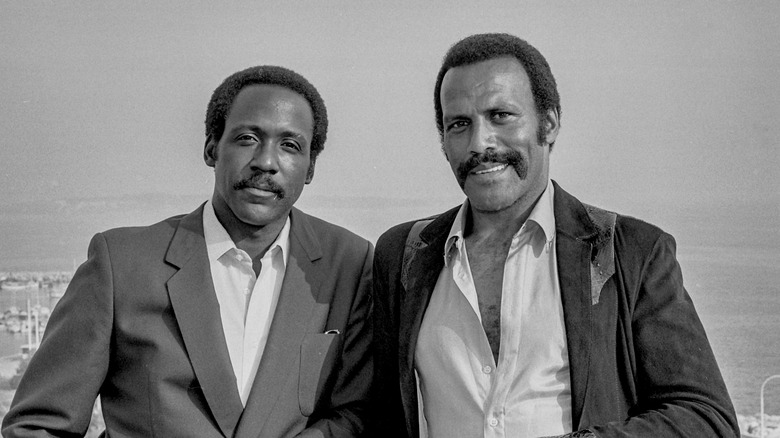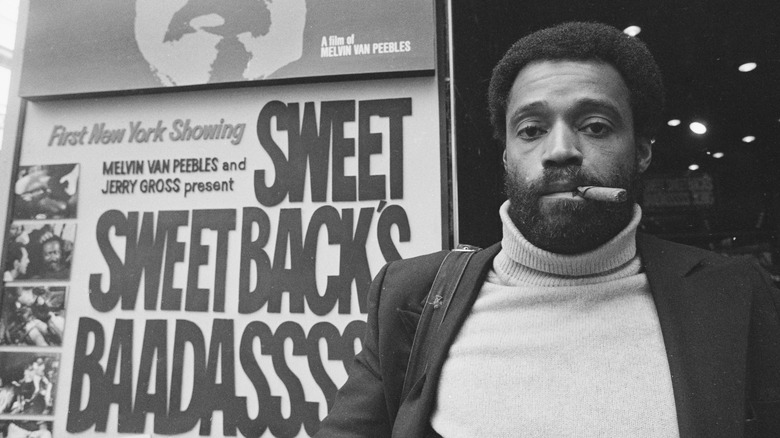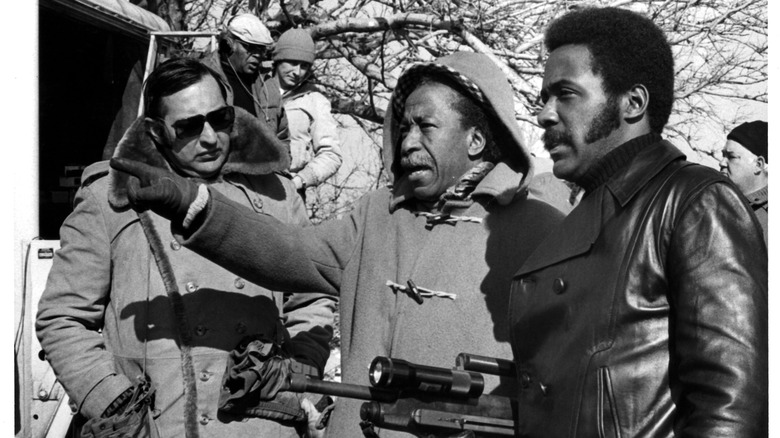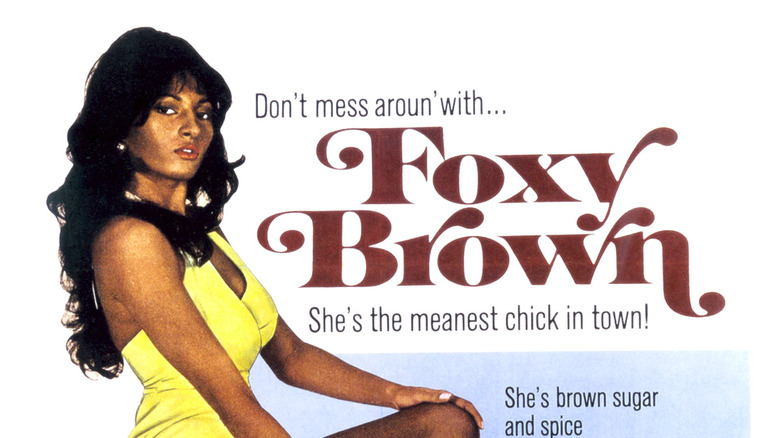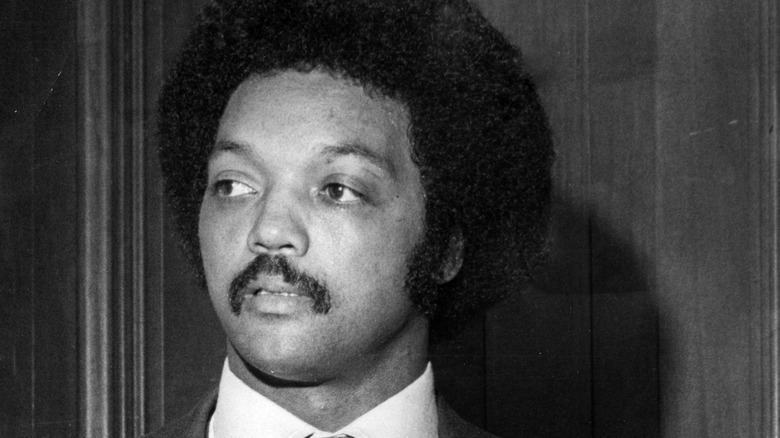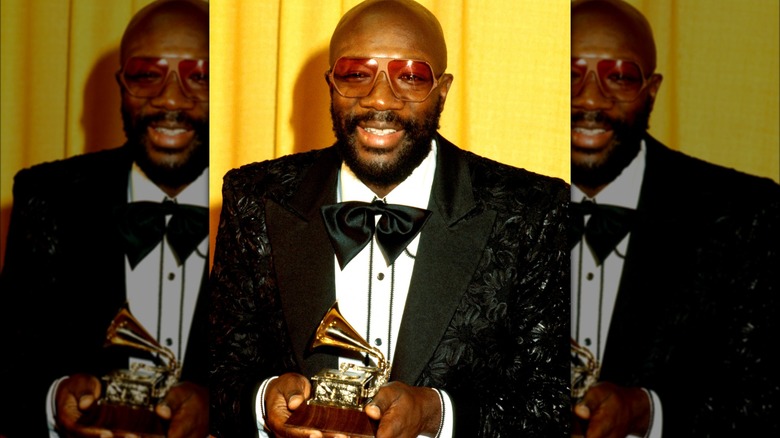What Is Blaxploitation?
The writer and director Melvin Van Peebles walked into a movie theater one day in 1971. The film was "Sweet Sweetback's Baadasssss Song," which Peebles had written, directed, produced, and starred in, and was like nothing seen before, per The Criterion Collection. "I go into the theater and the theater is packed and not a sound," Van Peebles recalled in the 2002 documentary "BaadAsssss Cinema." "When Sweetback got away, there was stunned silence. And then the place exploded." The film, which had equal parts sex, violence, and politics, would help kick off a new film genre that would eventually become known as blaxploitation.
"What Hollywood did, they suppressed the political message, added caricatures, and blaxploitation was born," Van Peebles said in the documentary. The blaxploitation genre of the 1970s had far-reaching cultural implications, from finally presenting Black characters on screen who fought and overcame the racist system on their own terms, to showcasing Black music and fashion, per Britannica. But many felt there were many negative impacts from the films, including damaging stereotypes, and a loss of meaningful political commentary in favor of sex, drugs, and violence.
Melvin Van Peebles and the beginnings the genre
Melvin Van Peebles, born in Chicago in 1932, received his B.A. in literature from Ohio Wesleyan University before embarking on a literary career that soon found him writing and directing his own independent films, according to Variety. His first Hollywood film, for Columbia Pictures, "Watermelon Man" earned him a three-picture deal, but he walked away to make "Sweet Sweatback's Baadasssss Song."
"The way I got into film ... I had a grudge growing, and growing, and growing against what I kept seeing on the screen," Van Peebles recalled in "BaadAsssss Cinema. "The cause I had was giving Black folks a sense of self which had been stolen from us." Van Peebles' film became the highest-grossing independent film at the time, per Variety. Made for $150,000, "Sweetback" raked in $15.2 million. It wouldn't take Hollywood long to see the potential for similar fare. "Shaft," an MGM production directed by Gordon Parks Jr., that came out the same year, would help solidify the genre, and link it to the funk and soul music of the era, per The Criterion Collection.
Gordon Parks and Shaft
While "Sweet Sweetback's Baadasssss Song" gave the genre a direction, Gordon Parks Jr.'s "Shaft" gave blaxploitation a star in Richard Roundtree, the titular Harlem detective. Roundtree, who died of cancer on October 24, 2023, was an unknown actor when Parks cast him in the part, according to Parks' "Voices in the Mirror: An Autobiography" and The New York Times. Parks, like Van Peebles, was a multi-talented artist who worked in a variety of different disciplines. Parks didn't believe the film would be a success but took the job in part because he felt "it was a film that could give Black youth their first cinematic hero."
"The first time I saw it, it was awesome," the actor Samuel L. Jackson recalled in "BaadAsssss Cinema. "He was like everything we always wanted to be. He was, like, cool, he talked tough, he looked great and he was kind of fearless. He was a hero." The film was a smash hit and spawned several sequels, per The Criterion Collection.
An explosion of blaxploitation films
"Shaft" not only became a hit film but had deeper cultural relevance that was greatly helped by a soundtrack written and performed by Isaac Hayes. The film also helped save MGM, all but guaranteeing a slew of similar Hollywood films. "That huge ripple that it created had to splash onto the shores of popular culture at some point." Film critic Elvis Mitchell said in "BaadAsssss Cinema. And just the idea of 'Shaft' saving the studio that was literally pawning Judy Garland's ruby slippers for $20,000 to keep the doors open was just a wonderful thing."
Soon the likes of such films as "Super Fly," also directed by Gordon Parks Jr., and a series of films starring Pam Grier, including "Coffy" and "Foxy Brown," hit movie screens, per Britannica. Then came a backlash from civil rights organizations concerned with the way Black people were being portrayed. Grier admitted that she was guilty of perpetuating some stereotypes. "We have to be very thoughtful of what we do and say on film," she said in "BaadAsssss Cinema. I broke them but I also created some because everyone thought a Black woman is a whoop-your-butt sister all the time."
The backlash
Junius Griffin, the president of the Beverly Hills-Hollywood NAACP chapter, who is credited with coming up with the term blaxploitation, fought hard against these films and helped launch a rating system concerning how Blacks were portrayed on film, per Britannica and The Los Angeles Times. "We must insist that our children are not constantly exposed to a steady diet of so-called Black movies that glorify Black males as pimps, dope pushers, gangsters and super males with vast physical prowess but no cognitive skills," Griffin said in 1972. Jesse Jackson also attacked the genre for its negative portrayals of Blacks.
Fred Williamson, a producer and actor in the genre, didn't feel these films were exploitative. "Who was being exploited?" he asked in "BaadAsssss Cinema."All the Black actors were getting paid, they had a job, they were going to work. The audience wasn't being exploited. They were getting to see things on their screens that they had longed for over the years. So I really don't understand where this terminology fits."
Actor Gloria Hendry, who also starred in several blaxploitation films in the 1970s, likewise had problems with the backlash. "I did not like that climate during that time," she said in the documentary. "These organizations failed to understand that the community was really in need of their own heroes and Black movies."
Cultural legacy
By the end of the 1970s, the blaxploitation genre was all but a memory, killed by a combination of the backlash against the genre's subject matter and portrayals of the Black experience, and a film industry that had moved on. "I saw our demise," Gloria Hendry recalled in the documentary. "I saw the actors, producers, production companies, directors ... I saw us dead. Black films saved Hollywood and when they got through with us ... they dropped us. The door slammed." Blaxploitation films may have died out, but they left an indelible cultural impact. The music alone from the genre is undeniably important. This includes the Grammy-winning soundtrack to "Shaft" by Isaac Hayes; Curtis Mayfield's soundtrack to "Super Fly;" and James Brown's music for "Black Caesar," among others.
The film genre kicked open the door for Black artists — writers, directors, and actors — who were involved in blaxploitation and those who followed them later in Hollywood. "[T]he commercial success of some of these movies, I think, certainly created more of a space for the directors that came after them," Adam Howard, a television producer and curator, told The Guardian in 2021. The genre also "created a new blueprint for what Black masculinity or Black femininity could be onscreen," according to Howard.
